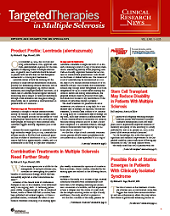Publication
Article
Targeted Therapies: Multiple Sclerosis
Stem Cell Transplant May Reduce Disability in Patients with Multiple Sclerosis
Author(s):
Patients with relapsing-remitting multiple sclerosis (RRMS) who received a non-myeloablative hematopoietic stem cell transplant (HSCT) experienced improved measures of disability and quality of life.

Patients with relapsing-remitting multiple sclerosis (RRMS) who received a non-myeloablative hematopoietic stem cell transplant (HSCT) experienced improved measures of disability and quality of life, according to a study published by Burt et al, January 20, 2015, in the Journal of the American Medical Association.1
“To our knowledge, this is the first report of significant and sustained improvement in the [Expanded Disability Status Scale] score following any treatment for MS,” the study authors wrote.
The study noted that 50% of patients with MS are unable to maintain employment 10 years from diagnosis and are unable to walk at the 25-year mark. The annual cost of treating MS is approximately $47,000 per patient; however, no therapy approved by the US Food and Drug Administration (FDA) can significantly improve neurologic disability or quality of life, according to the study.
Autologous HSCT is intended to reset the immune system, as opposed to suppressing it. The Burt study evaluated the association between non-myeloablative HSCT and neurologic disability, along with other clinical outcomes, in patients with RRMS treated between 2003 and 2014.
The study included 145 patients with an average follow-up of 2.5 years. Significant improvement was found in 41 patients (50%) tested at 2 years and in 23 patients (64%) tested at 4 years on the EDSS score.
Additionally, HSCT was linked to improvements in physical function, cognitive function, and quality of life. The researchers also observed a reduction in the volume of brain lesions associated with MS. The 4-year relapse-free survival was recorded at 80%, while progression-free survival was 87%.
Patient selection is also a vital factor in determining outcome, the study found.
“In the post hoc analysis, the EDSS score did not improve in patients with secondary-progressive MS or in those with disease duration longer than 10 years,” the authors wrote.
An accompanying editorial by Stephen L. Hauser, MD, noted that autologous HSCT does not appear to be effective in treating established progressive forms of MS and that immunosuppressive regimens with HSCT are apparently effective against RRMS over several years of observation.2
“However, it is by no means clear that the beneficial effects result from the infusion of stem cells rather than from the conditioning regimen,” Hauser wrote. “Given the availability of highly effective FDA-approved therapies against relapsing-remitting MS, it would seem reasonable to use these proven monotherapies in the clinical setting before considering complex HSCT regimens.”2
References
1. Burt RK, Balabanov R, Han X, et al. Association of nonmyeloablative hematopoietic stem cell transplantation with neurological disability in patients with relapsing-remitting multiple sclerosis. JAMA. 2015;313(3):275-284.
2. Hauser SL. Hematopoietic stem cell transplantation for MS: extraordinary evidence still needed. JAMA. 2015;313(3):251-252.






